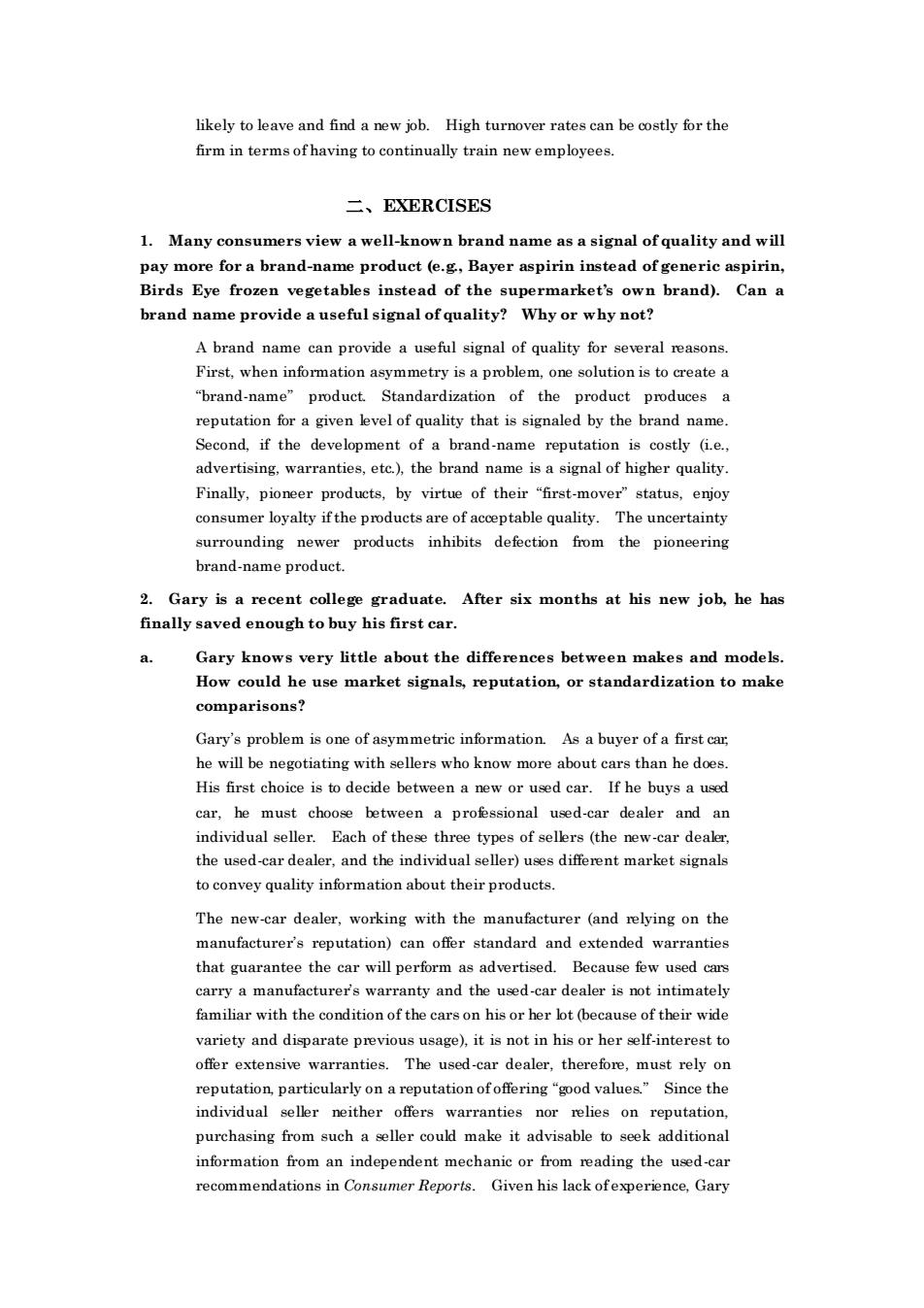正在加载图片...

likely to leave and find a new iob.High turnover rates can be costly for the firm in terms of having to continually train new employees. 二、EXERCISES 1.Many consumers view a well-known brand name as a signal of quality and will pay more for a brand-name product (e.g,Bayer aspirin instead of generic aspirin, Birds Eve frozen vegetables instead of the supermarket's own brand).Can a brand name provide a useful signal of quality?Why or why not? A brand name can provide a useful signal of quality for several reasons First when infor "brand-name product. Standardization of the product produces a reputation for a given level of quality that is signaled by the brand name Second.if the development of a brand-name reputation is costly (ie. advertising.warranties,etc.).the brand name is a signal of higher quality. Finally,pioneer products,by virtue of their"firs nover”status,enjoy conumer loyalty if the productsare of aceptable quality.The uncertainty surrounding newer products inhibits defection from the pioneering brand-name product. 2.Gary is a recent college graduate.After six months at his new job,he has finally saved enough to buy his first car. Gary knows very little about the differences between makes and models. How could he use e market signals,reputation,or standardization to make comparisons? Gary's problem is one of asymmetric information.As a buyer of a first car he will be negotiating with sellers who know more about cars than he does His first choice is to decide between a new or used car.If he buys a used car.be must choose between a professional used-car dealer and an individual seller.Each of these three pes of selers(the new-car dealr the used car dealer seller)ues different ma t signal to convey quality information about their products. The new-car dealer,working with the manufacturer(and relying on the manufacturer's reputation)can offer standard and extended warranties that guarantee the car will perform as advertised.Because few used cars carry a manufacturer's warranty and the used-car dealer is not intimately familiar with the condition of ot (because of their wide variety and disparate previous usage),it is not in his or her self-interest to offer extensive warranties.The used-car dealer,therefore,must rely on reputation,particularly on a reputation of offering "good values."Since the individual seller neither offers warranties nor relies on reputation. purchasing from cou make it additional information from an independent mechanic or from reading the used-car recommendations in Consumer Reports.Given his lack ofexperience.Garylikely to leave and find a new job. High turnover rates can be costly for the firm in terms of having to continually train new employees. 二、EXERCISES 1. Many consumers view a well-known brand name as a signal of quality and will pay more for a brand-name product (e.g., Bayer aspirin instead of generic aspirin, Birds Eye frozen vegetables instead of the supermarket’s own brand). Can a brand name provide a useful signal of quality? Why or why not? A brand name can provide a useful signal of quality for several reasons. First, when information asymmetry is a problem, one solution is to create a “brand-name” product. Standardization of the product produces a reputation for a given level of quality that is signaled by the brand name. Second, if the development of a brand-name reputation is costly (i.e., advertising, warranties, etc.), the brand name is a signal of higher quality. Finally, pioneer products, by virtue of their “first-mover” status, enjoy consumer loyalty if the products are of acceptable quality. The uncertainty surrounding newer products inhibits defection from the pioneering brand-name product. 2. Gary is a recent college graduate. After six months at his new job, he has finally saved enough to buy his first car. a. Gary knows very little about the differences between makes and models. How could he use market signals, reputation, or standardization to make comparisons? Gary’s problem is one of asymmetric information. As a buyer of a first car, he will be negotiating with sellers who know more about cars than he does. His first choice is to decide between a new or used car. If he buys a used car, he must choose between a professional used-car dealer and an individual seller. Each of these three types of sellers (the new-car dealer, the used-car dealer, and the individual seller) uses different market signals to convey quality information about their products. The new-car dealer, working with the manufacturer (and relying on the manufacturer’s reputation) can offer standard and extended warranties that guarantee the car will perform as advertised. Because few used cars carry a manufacturer’s warranty and the used-car dealer is not intimately familiar with the condition of the cars on his or her lot (because of their wide variety and disparate previous usage), it is not in his or her self-interest to offer extensive warranties. The used-car dealer, therefore, must rely on reputation, particularly on a reputation of offering “good values.” Since the individual seller neither offers warranties nor relies on reputation, purchasing from such a seller could make it advisable to seek additional information from an independent mechanic or from reading the used-car recommendations in Consumer Reports. Given his lack of experience, Gary